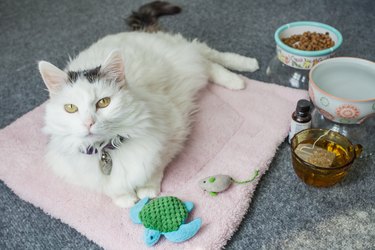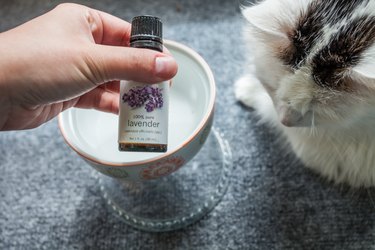
Cats can easily become stressed due to a variety of reasons, including the arrival of a new person in the house, the addition of another pet, or a move to a new house. Stress can cause several behavioral issues in your cat, like urine marking or aggression, and may even compromise her health in some cases.
After having a vet rule out an illness as the cause of your kitty's anxious or otherwise stressed-out behavior, help to keep her calm with some vet-approved natural solutions. Natural calming remedies for cats, soothing music, and regular exercise may soothe your cat's anxiety, reducing her stress without the need for prescription medications.
Video of the Day
Video of the Day
DIY cat calming spray
Flower essences are liquid tinctures made from various flowers with calming properties. Unlike most tinctures, those made specifically for pets such as Bach Rescue Remedy are made with food-grade vegetable glycerin instead of alcohol, making them safe for use with our feline friends.

You can add a few drops of these remedies to your kitty's water bowl. Or, mix the flower essence with water to make a DIY cat calming spray and spray it on your cat's bedding and spaces where she likes to relax. This should help reduce your cat's anxiety symptoms. Of course, before using these types of homeopathic medications, consult with your vet.
Natural calming remedies for cats
Catnip, an herb in the mint family, and silver vine both contain chemicals that produce euphoric reactions in most kitties. These chemicals are called iridoids. When your cat sniffs these plants, she may become hyper for a few minutes or roll around in ecstasy before calming down.
Ingesting the plants has a mildly sedative effect in kitties. You can sprinkle the leaves of the plants over your cat's food or bake them into homemade calming treats for cats. These herbs are considered safe for cats and you can find dried catnip and silver vine in many pet stores. Giving your feline friend some catnip-stuffed toys or sprinkling catnip around the areas she likes to hang out may help to de-stress your cat. You also can grow catnip indoors for your kitty to munch on.
Create some DIY Feliway
Feliway is a commercially available product that mimics the natural calming face pheromones of your feline friend. While there is no home recipe to make these synthetic pheromones, you can gently rub a towel on your cat's cheeks and get his scent on the towel. This towel then becomes a kind of DIY Feliway.
Place the towel in your cat's bedding or in any spot that your cat likes resting. The face pheromones of a cat have calming properties and should naturally reduce your cat's anxiety. You can refresh this towel as needed by softly rubbing it on your cat's cheeks. You can also use a shirt of your own so that it will have your cat's pheromones and your own calming scent for him.
Feline stress-reducing home remedies

Play soft classical music or cat-specific music for your cat to help lower your cat's stress levels. The soft tunes can help calm your cat during the day, especially for cats dealing with separation anxiety.
Help reduce stress for your feline friend by providing her with some exercise each day in the form of interactive play with you. And provide her with some puzzle toys to play with while you're away.
Place a comfy cat bed and a climbing tree in a quiet corner of your home so that your cat has plenty of spots where she can relax and feel safe. If you have more than one cat, provide each cat with at least one litter box; provide an additional litter box for all of your cats as well.
Spray a synthetic feline pheromone around your home to give your kitty a sense of well-being. Or, use a pheromone diffuser to fill the space with the calming scent. It's odorless to people, so it won't bother your nose.
Always check with your veterinarian before changing your pet’s diet, medication, or physical activity routines. This information is not a substitute for a vet’s opinion.
- The Ohio State University College of Veterinary Medicine: Life Stressors of Cats: How to Make Your Cat More Comfortable When Stress Occurs
- Innovative Veterinary Care: Integrative Treatment for Inappropriate Urination in Cats
- Journal of Feline Medicine and Surgery: Improving the Feline Veterinary Consultation: The Usefulness of Feliway Spray in Reducing Cats’ Stress
- American Veterinary Society of Animal Behavior: Can Music Make Cats Less Stressed?
- American Association for the Advancement of Science: Why Cats are Crazy for Catnip
- VCA West Los Angeles Animal Hospital: Environmental Enrichment for Senior Dogs & Cats